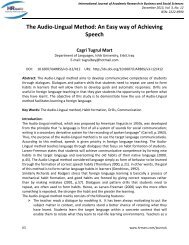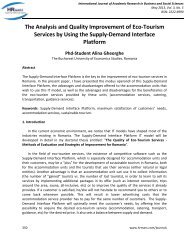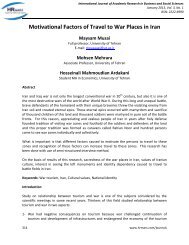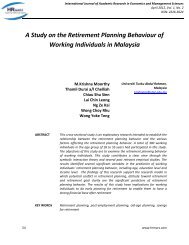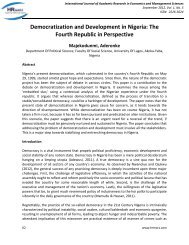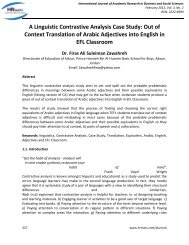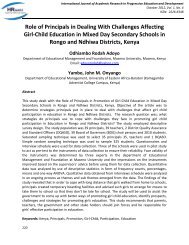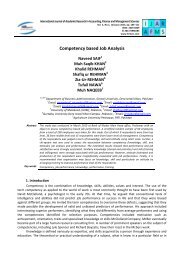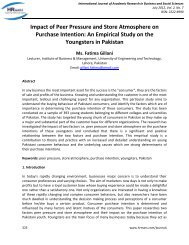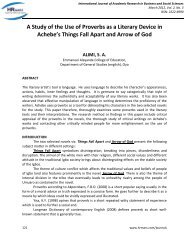Full Text PDF - Human Resource Management Academic Research ...
Full Text PDF - Human Resource Management Academic Research ...
Full Text PDF - Human Resource Management Academic Research ...
Create successful ePaper yourself
Turn your PDF publications into a flip-book with our unique Google optimized e-Paper software.
Proceedings of the 2011 International Conference on Teaching, Learning and Change<br />
(c) International Association for Teaching and Learning (IATEL)<br />
Ordinarily speaking, politics may be understood as the means of gaining the control of state<br />
administrative apparatus. This means that it can be conceived as an act or process that involves every<br />
action, reaction, correspondence, rule, regulation, effort and any instrument put in place by<br />
constituted body of persons to achieve the polity objectives of the state (Nweke 2009). Defining<br />
politics, Lasswell (1958) says that it is:<br />
i. who gets what, how and when?<br />
ii. an authoritative allocation of values in society.<br />
In as much as Nweke’s view may not be wrong, Lasswell’s definition seems to provide a good<br />
ground for this study. This is so because the synthesis of his synopsis seems to reflect the true<br />
Nigerian situation. The clarion call by Nigerians that education and primary education in particular<br />
need to be accorded the right place in the scheme of things attest to Lasswell’s definition of politics<br />
that says ‘allocation of values in society’. No prophet or teacher is needed to explain the fact that<br />
primary education is yet to be given the desired attention by government. If the above assumption is<br />
right, it means that those who manage it or politicize with it have only met one of Lasswell’s view<br />
hence he asserts that politics with any thing is targeted at determining who gets what, how and when;<br />
and thereby placing a wrong value to its worth.<br />
2. Government Policy and Primary Education<br />
Policy may generally be understood as a position statement that guides the activities of a<br />
person or group of persons to attain given objectives. In Nigeria, the intention of government<br />
towards primary education is as shown in the National Policy of Education. An assessment of the<br />
intention as contained in the policy show that the good wishes of government towards primary<br />
education are yet to be realized. This simply means that the government has exhibited lukewarm<br />
attitudes in participating over making the content of the policy a reality to the people. It may<br />
not be enough to state this without citing given instances. No doubt, the government of Nigeria has<br />
in several quarters declared that education at the primary school level is free. Free? Some of those<br />
who attend public primary schools make their desks, buy their books and other writing materials as<br />
well as indirectly pay for certain services. On the other hand, those who attend private primary<br />
schools pay for virtually all services.<br />
3. Government Participation and Primary Education<br />
The concept of participation simply means ‘taking part in ……… ‘The part or role played by<br />
government in the management of primary education provides room for all the blames pushed to the<br />
side of government. An account of its roles suggests why she is understood as being political, only a<br />
policy maker, a powerless supervisor and squander of meaningful programmes. An antecedent of<br />
educational policies and programmes targeted at improving the primary education sub sector shows<br />
that the government is not far from the description rendered in the preceding sentence. Several<br />
instances can guarantee the above courageous claim. For instance, the non fulfillment of grants in<br />
aids to primary schools by the colonial government is a reference point. The disagreement on which<br />
tier of government funds primary education through the National Primary Education Commission<br />
(NPEC) is another case in point. The failures of both the national and regional UPE as well as the<br />
765
Proceedings of the 2011 International Conference on Teaching, Learning and Change<br />
(c) International Association for Teaching and Learning (IATEL)<br />
epileptic implementation of the policies and programmes synonymous with the on-going UBE<br />
programmes are eloquent testimonies as well. Going by these, the government participation in<br />
primary education cannot be described on a positive note.<br />
THE PARTICIPATION, POLITICS AND POLICES OF GOVERNMENT<br />
A trace of the origin of primary education in Nigeria shows that its commencement has<br />
several characteristics. The features are:<br />
1. It was carried out by investors such as churches, individuals and voluntary agencies.<br />
2. Its initiation by the white men was done to enable Nigerians to know how to read and write;<br />
thereby ease the problem of communication in course of carrying out their nefarious businesses.<br />
3. The British government showed no interest in its affairs.<br />
4. Poor curriculum. Fafunwa (1974:88) observes that “there was no common curriculum among the<br />
missions …..indeed each school within a mission followed its devices”.<br />
Following the manner and way it started, one may say that its initial problems are still<br />
haunting it. Therefore lack of government participation in implementing good policies may be traced<br />
to its origin. Government lackadaisical attitude towards primary education is show-cased in many<br />
ways. Some of them are:<br />
1. Poor and Epileptic Financial Attention: Right from the days of the colonial era till now<br />
government cannot be credited for funding primary education adequately; commenting on this<br />
Ogbondah (2008:12) laments that:<br />
It was not until 1872 that the colonial government made superficial attempts at<br />
making financial contributions to the development of formal education in Nigeria with<br />
a paltry £30 (thirty pounds) now N60 (sixty naira) given to the three major missions<br />
of the Church Missionary Society, Roman Catholic Mission and the Wesleyan<br />
Methodist Church.<br />
Poor enthusiasm to participate in funding primary education by government was further<br />
demonstrated among the three tiers of government during the era of National Primary Education<br />
Commission (NPEC). Following the lingering problems associated to primary education, the NPEC<br />
was set up to rescue primary education from imminent collapse arising from inadequate funding,<br />
poor management and neglects of yester years. By the establishment of the commission through the<br />
enactment of decree No. 31 of 1988; major changes were ushered to the primary school system.<br />
Some of the changes were:<br />
a. Separation of primary education from secondary education under the management of a board.<br />
b. The funding of primary education nationwide wide under the auspices of the federal<br />
government.<br />
c. It also established Local Government Education Authority (LEA)<br />
766
Proceedings of the 2011 International Conference on Teaching, Learning and Change<br />
(c) International Association for Teaching and Learning (IATEL)<br />
Two years after, the federal government backslided from its earlier stand by abrogating the 1988<br />
decree and promulgated decree No. 2 of 1991 that transferred the funding and management of<br />
primary education to the local government. By this arrangement, the primary school system had the<br />
following features:<br />
a. The Local Governments became autonomous and responsible for the funding and<br />
management of primary schools within their jurisdiction.<br />
b. The council chairmen automatically became the head of the local government education<br />
authority.<br />
c. The federal government allocation to local government increased from 10% to 15% in 1991<br />
and 15% to 20% in 1992 yet local governments were uncomfortable with the imposed<br />
responsibility and fronted several reasons why they could not meet up with their new tasks.<br />
d. Zero allocation syndrome characterized the local governments due to deduction of primary<br />
education/health care funds from the local government pause.<br />
By 1993, federal government sought the means to resuscitate the defunct NPEC by<br />
promulgating decree No. 96 of 1993. The decree charged the commission with the responsibility of<br />
disbursing funds to LEA through the State Primary Education Board. This decree wrought certain<br />
changes to the commission. Some of them were:<br />
a. The local government education authority could only perform delegated functions, but may<br />
initiate their own primary education policy.<br />
b. Under decree 96 of 1993, the secretary of the local government education authority became the<br />
chief executive and principal accounting officer.<br />
Considering the political disposition of government in managing the affairs of primary education<br />
in Nigeria as show-cased above, no one may exonerate her from the stagnant state of things in the<br />
system. Consequent on its preponderance effect on the system, one expects her to come up with<br />
policies and programmes that would free the system from its state of pity. Perhaps it is on this note<br />
that the government shows a level of willingness to participate in proper funding and management of<br />
primary education through the formulation of ideal policies and programmes. An x-ray of such<br />
programmes may not be very necessary. Therefore this study intends to use the on-going UBE<br />
programme as a case in point. However two other programmes worthy of mention in this context<br />
are the National and Regional Universal Primary Education Programmes (UPE) during the 1950’s<br />
and early 1960 and 1976 to early 1980’s respectively. Within the 1950’s and part of 1960’s the three<br />
regions in Nigeria namely South, West and North made conscious efforts to offer primary education<br />
free to the people. The 1950 – 1960 UPE regional programmes were generally described as a failure<br />
with the greatest success recorded in the West. The different premium attached to the programme by<br />
the various regions determined the level of success recorded in the different regions. It is pertinent to<br />
point out that the diversity in the success or failure of the programme among the regions may be<br />
responsible for the phenomenon common to education in Nigeria known as advantaged and<br />
disadvantaged educational states.<br />
Following the imbalance created by the 1950’s to 1960’s regional UPE programme, the<br />
government has shown the desire with little commitment to make basic education Available to the<br />
people. This, we can all see that the 1963 constitution was amended such that education other than<br />
767
Proceedings of the 2011 International Conference on Teaching, Learning and Change<br />
(c) International Association for Teaching and Learning (IATEL)<br />
higher education came under the concurrent responsibility of both the federal and state<br />
governments. This declaration was further justified in (1977) when the government through her<br />
national policy on education states that:<br />
Education in Nigeria is no more a private enterprise but a huge government venture that has<br />
witnessed a progressive evolution of government’s complete and dynamic intervention and active<br />
participation. The federal government of Nigeria has adopted education as an instrument for<br />
effecting national development (Federal Republic of Nigeria, 1977:3)<br />
Before the roll out of the National Policy in 1977 the federal government under General Olusegun<br />
Obasanjo the then military head of state formally flagged off the UPE programme on Monday 6 th<br />
September 1976 during a ceremony held at Oke Suna Municipality Primary School, Lagos<br />
(Okorosaye – Orubite: 2008). Besides the government policies and public pronouncements, primary<br />
education in Nigeria is still characterized with poor teacher pupil ratio, poor funding, poor<br />
infrastructural and instructional facilities, poor enrolment and drop-out rates etc. Perhaps in attempt<br />
to bridge the observed gap and the williness to match action with words, the government under<br />
President Olugegun Obasanjo on 30 th September, 1999 at Sokoto made a public show of her good<br />
intention to universally and compulsorily offer basic education to all Nigerians by introducing the<br />
on-going UBE programme. This can be understood as a strategy to over come the problems that<br />
have short-circuited the proper flow of events in the primary education sub-sector. Some quarters<br />
belief that apart from the above reason the government may rationalize the introduction of UBE<br />
programme on several grounds. Chief among their philosophy are as follows:<br />
1. Fulfillment of the content of International treaties signed by Nigeria: Nigeria has been a<br />
signatory to major international convenants on basic education. Some of such treaties are:<br />
a. Jomtien Declaration and framework for Africa on Education for all (1990);<br />
b. New Delhi (1991) Declaration on E – 9 countries;<br />
c. Ouagadougou (1992) Declaration on the Education of Women and Girls;<br />
d. Amman (1996) Affirmation on the pursuit of the Goals of Jomtien;<br />
e. Durban (1998) statement of commitment on inter-African collaboration for the Development<br />
of Education;<br />
f. OAU Decade of Education in Africa (1997 – 2006);<br />
g. The Dakar (2000) Education for all (EFA) forum.<br />
Source: Adapted from FRN (2000)<br />
The consent given to the above treaties, mostly the Education For All (EFA) may be held<br />
responsible by some people for government’s magnanimous declaration of the UBE programme.<br />
Not to be left out among the treaties is the United Nations Declaration on <strong>Human</strong> Rights (1948)<br />
which stipulates that every child has a right to education. Nigeria was not a member as at 1948 but<br />
adopted the UN’s declaration as soon as she gained independence in 1960.<br />
2. Attainment of Millennium Development Goals (MDGs): A scan of the philosophy behind<br />
the millennium development goals shows that the child which does not exclude the Nigerian<br />
768
Proceedings of the 2011 International Conference on Teaching, Learning and Change<br />
(c) International Association for Teaching and Learning (IATEL)<br />
child is a major beneficiary in the actualization of the goals. Briggs and Nte (2008) explains<br />
that:<br />
As a means of domiciling issues of Child Development in its proper perspective, we<br />
wish to observe the serious concerns of the global community on the matter. The<br />
Millennium Development Goals (MDGs), which were ractified by 189 Heads of state<br />
and governments in 2000, probably constitute the most audacious plan ever made by<br />
mankind to improve the quality of life and to assure the well-being of all. The goals<br />
refer frequently, albeit in a tangential manner, to the issue of proper Child<br />
Development as a precursor to subsequent healthy living in a number of the 8<br />
development goals. 21 quantifiable targets, and 60 indicators by the target date 2015.<br />
Specifically, MDG 2 requests that by that target date, children everywhere, boys and<br />
girls, should be able to complete a course of primary school education.<br />
Going by the emphasis laid by the MDG’s as explained by Nimi and Nte one may deduce<br />
that the attainment of a sound primary education is not only a Nigerian issue rather a global concern.<br />
Therefore the policies and programmes of government directed towards the child primary education<br />
may be conceived as a right step in the right direction if genuine efforts are made to actualize them.<br />
3. The Right of the Child: Just as stated in 1948 by United Nations ‘every child has a right to<br />
education. In Nigeria, the Nigerian’s child rights act of 2003 states among other things that<br />
“every child has a right to survival and development (FRN; 2003). It defines free compulsory<br />
basic education as the right of every child and charged government with the responsibility of<br />
providing it. In the bid to fulfill this obligation, the government on May 26, 2004 approved a<br />
bill known as Compulsory, Free, Universal Basic Education; bill No. 66, volume 91. The bill<br />
among others stipulates that:<br />
1. Without prejudice to the provisions of item 30 of Part 11 of the second schedule and item 2 (a)<br />
of the Fourth Schedule to the 1999 Constitution dealing with primary school education, the<br />
Federal Government’s intervention under this Act shall only be an assistance to the States and<br />
Local Governments in Nigeria for the purposes of uniform and qualitative basic education<br />
throughout Nigeria.<br />
2. (1) Every Government in Nigeria shall provide free, compulsory and universal basic education<br />
for every child of primary and junior secondary school age.<br />
(2) Every parent shall ensure that his child or ward attends and completes his<br />
(a) Primary school education; and<br />
(b) junior secondary school education, by endeavouring to send the child to<br />
junior secondary schools.<br />
primary and<br />
3. The stake-holders in education in a Local Government Area, shall ensure that every parent or<br />
person who has the care and custody of a child performs the duty imposed on him under<br />
section 2(2) of this Act.<br />
4.. A parent who contravenes section 2(2) of this Act commits an offence and is liable-<br />
769
Proceedings of the 2011 International Conference on Teaching, Learning and Change<br />
(c) International Association for Teaching and Learning (IATEL)<br />
a. on first conviction, to be reprimanded;<br />
b. on second conviction, to a fine of N2,000:00 or imprisonment for a term of 1 month or to<br />
both; and<br />
c. Consequent conviction, to a fine of N5,000:00 or imprisonment for a term of 2 months or<br />
to both.<br />
3… (1) The services provided in public primary and junior secondary schools shall be free of<br />
charge<br />
(2) A person who receives or obtains any fee contrary to the provisions of subsection (1) of this<br />
section commits an offence and is liable on conviction to a fine not exceeding N10,000:00 or<br />
imprisonment for a fine not exceeding N10,000:00 or imprisonment for a term of 3 months or<br />
to both<br />
4… (1) Every parent shall ensure that his child receives full-time education suitable to his age,<br />
ability ad aptitude by regular attendance at school.<br />
(2) The provisions of sections 2(2) and 4(1) of this Act shall not apply to any parent who,<br />
for the time being, is resident outside Nigeria.<br />
5. The provisions of section 2 and 3 of this Act shall not apply to any child who is resident<br />
outside Nigeria and who has not received such education.<br />
6. The Magistrate Court or any other state court of competent jurisdiction shall have<br />
jurisdiction to hear and determine cases arising under section 2 of this Act and to impose<br />
the punishment specified.<br />
Source: Federal Government Gazette on Compulsory, Free, Universal, Basic Education.<br />
No. 66, Volume 91<br />
An interpretation of government’s proposal implies the guarantee of the child to be educated.<br />
Unfortunately, the activities of government may not warrant any one to declare that she backs her<br />
words with action.<br />
4. National Committee Reports and Policies: Following the obvious failure of the regional UPE<br />
programme in the 1950’s due to politicization and the desire of political office holders to<br />
conserve funds for either personal use or political aggrandizement; committees were set up at<br />
both the regional and federal tiers of government. The reports of those committees led to the<br />
1969 curriculum conference that gave birth to 1976 UPE programme; national policy on<br />
education in 1977 and the 6 – 3 – 3 – 4 system of education. Going further to discuss this,<br />
without sparing time to throw light on the issue of politicization, good meaning may not be<br />
gotten from the position of this writer who may have claimed that politicization of educational<br />
policies and programmes has remained the highest problem of education in Nigeria. A good<br />
instance of this assumption is traceable to the dramatic change of both the political leaders and<br />
770
Proceedings of the 2011 International Conference on Teaching, Learning and Change<br />
(c) International Association for Teaching and Learning (IATEL)<br />
the head of the Eastern UPE programme in 1953/1954. The sudden change of professor Eyo Ita<br />
as the head of political power in Eastern Nigeria and Mr. R. I. Uzoma as the region’s minister of<br />
education resulted to the abandon of the systematic regional UPE programme of the East as was<br />
programmed by professor Eyo Ita led administration. The quash and compulsory take over of<br />
Dr. Nnamdi Azikiwe and Akpabio as head of government and educational business respectively<br />
from their predecessors was not a good omen to primary education in Nigeria and the East in<br />
particular.. Accounting on this, Okorosaye – Orubike (2008) explains that<br />
Having lost out in the struggle for a majority of his party members to control the Western<br />
House of Assembly in 1952, Dr. Nnamdi Azikiwe found himself as the only national<br />
leader of a najor political party in Nigeria that was not in control of a government. Sir<br />
Ahmadu Bello and Chief Obafemi Awolowo were leaders of Government business in the<br />
North and West respectively. Thus embittered Nnamdi Azikiwe moved base from<br />
Lagos/Ibadan to Enugu in 1953 and amidst political and ethnic disaffection wrestled<br />
power from Prof. Eyo Ita ( an Efik) and assumed power as premier in 1954.<br />
This power reshuffle did not only affect the political administration alone because the<br />
greatest casualty was the primary education hence R. I. Uzoma gave way to I. U. Akpabio (the<br />
former principal of Ibibio State College, Ikot Ekpene) as minister of Education and so did Eyo<br />
Ita/Uzoma UPE policy give way to Azikiwe/Akpabio fire brigade UPE programme that manifested<br />
its failures in almost all dimensions. Perhaps in the bid to correct the anomalies several policies and<br />
programmes of government directed at re-positioning primary education have been propounded,<br />
implemented and failed. However the government do not seem to be tired on matters concerning<br />
education in Nigeria. This is so because during the Ibrahim Badamosi Babangida’s led<br />
administrations as head of state in 1980’s; the federal government set up a committee headed by Dr.<br />
Samuel J. Cookey to work out modalities on how to make the first nine years of education in Nigeria<br />
free, compulsory and universal. The committee made up of eminent Nigerians from all works of life<br />
asserts that:<br />
Nigeria has a literacy rate of only about 20 percent for people who are above 15 years old.<br />
This shows urgency for a scheme or mas education if the population is to be socially<br />
mobilized. In order to have a literate Nigerian society there is need to have the education of<br />
our Youths free for the FIRST NINE YEARS (FRN: 1987)<br />
Observations show that the reports of the Cookey headed bureau did not attract any<br />
significant response until the declaration of the UBE programme by the government in 1999.<br />
Following the above account one may be tempted to observe that government is only good in setting<br />
committees and propounding politics without equivalent commitment to implement the content of<br />
those reports and policies. A sum of such disposition may be understood as POLITICIZATION.<br />
IMPLICATIONS OF GOVERNMENT POLITICS AND POLICIES<br />
771
Proceedings of the 2011 International Conference on Teaching, Learning and Change<br />
(c) International Association for Teaching and Learning (IATEL)<br />
The way and manner government handles issues related to primary education may not have<br />
left the system without effects. The lessons or experiences acquired over the years may warrant the<br />
activities of government towards primary education to be described in the following ways:<br />
1. Neglect of Treaties: The government is known for participating in several treaties related to<br />
primary education. Inspite of her consent to such agreement of nations, no one can confidently<br />
say that she has been religious in implementing the resolution of such treaties.<br />
2. Commercialization of the Child’s Education: The proliferation of private nursery primary<br />
schools is traceable to the disposition of government in both its funding and management.<br />
Government attitude towards childhood education may have warranted some people to describe<br />
the government as a licensing officer; hence she is responsible for authorizing the private school<br />
operators. In this vein, Yahaya in Yoloye (1993: 50) asserts that “this level gets very little mention<br />
perse, in the laws of the country because it is optional and with very rare exceptions, a wholly<br />
private system”.<br />
3. Quality of Education: Correlating the fact that the government policies and intentions in signing<br />
treaties targets at ensuring quality education for all and the fact that they are yet to match actions<br />
with their words, it means that they are not interested in letting all acquire good education. The<br />
fact that education at the primary school level is a basic one, such that none acquisition of the<br />
skills imparted at that stage among Nigerians may lead to the production of citizens who may not<br />
distinguish wrong from right. The government needs to demonstrate the minimum sagacity in<br />
rendering it as a need and not as a want. Anero (2008) observes that “a man without a functional<br />
academic background and has no special vocational skill is a curse to humanity. He further<br />
explains this by stating that such a person is characterized as follows:<br />
a. He cannot care for himself;<br />
b. He depends on nothing for survival and passes a hopeless life;<br />
c. Members of his immediate family fend for him, else he will die premature and serve as a source<br />
of reproach to them; and<br />
d. He does not possess the capability to meaningfully contribute towards the growth and<br />
development of the society.<br />
Infact he is known as Mr. NOBODY!<br />
4. Neglect to Societal Development: The reasons are abundant to support the fact that education<br />
is a major instrument for societal development. Yet, it may not have accorded the required<br />
recognition by government who is known as the chief manager. This accusation stem from the<br />
fact that sometimes, panels set up to look into educational issues do not diligently carry out their<br />
functions much more implementing the recommendation of committees, panels and educational<br />
boards. The editorial of Argus newspaper (2003) holds that<br />
772
Proceedings of the 2011 International Conference on Teaching, Learning and Change<br />
(c) International Association for Teaching and Learning (IATEL)<br />
The urgent need for the panel to carry out its task independently is anchored in the premise<br />
that education is too serious a business to toy with …. We therefore appeal to the respectable<br />
members of the panel to remain immune to whatever pressures they may be brought to bear on<br />
them and remain focused to transparency.<br />
The lesson from this account implies that if the government deserves the development of the<br />
society, it must of necessity carry out the content of all treaties that she signed as well as fully<br />
implement the recommendations of committees, panels, boards, councils and so on.<br />
Conclusion<br />
The major business of this paper was the examination of government participation in matters<br />
related to primary education. It explained that the extent of participation can best be described as<br />
politicization. The above conclusion was buttressed by examining the promise and fail syndrome<br />
synonymous with government decisions over the funding and management of primary education<br />
programmes. It stressed that government inability to fulfill her declaration is traceable to the days of<br />
British colonial rule in Nigeria. The study emphasized that all forms of government has not<br />
exempted itself from the wreckless abandon of primary educational programmes. It inferred that the<br />
poor disposition of government towards matters related to primary education should be held<br />
accountable for poor quality of education in Nigeria.<br />
Recommendations<br />
In as much as no one may argue that government politicization over policies and<br />
programmes directed at improving primary education is an evil wind that pays no one no good; the<br />
following recommendations are made:<br />
1. NGO’s, agencies and other groups should encourage government to implement the content of<br />
treaties, policies and programmes targeted at improving primary education;<br />
2. The legislative arm of the government at all tiers of government should make laws that could<br />
be pragmatic in effecting checks and balances to guarantee policies and programmes in favour<br />
of primary education<br />
References<br />
Anero, N. (2008) Education: The Best Option for the Youths. The International Chercheur. Graduate<br />
School, University of Calabar, Nigeria. 1(1).<br />
Argus Newspaper (2003). That ASUU strikes; Lessons, Expectations. Port Harcourt Argus Newspaper.<br />
Briggs, N. and Nte, A. (2008). Child Development and Developmental Disorders in Nigeria:<br />
Prospects and Challenges for the 21 st century. A Keynote Address Presented during a<br />
conference organized by the Association of Child Development and Commun8cation Disorders,<br />
Nigeria held at University of Port Harcourt, Nigeria, 23 rd – 26 th June, 2008.<br />
Fafunwa, A. B. (1974). History of Education in Nigeria. London: George Allen & Unwin.<br />
773
Proceedings of the 2011 International Conference on Teaching, Learning and Change<br />
(c) International Association for Teaching and Learning (IATEL)<br />
Federal Republic of Nigeria (1987). Report of the Cookey headed Political<br />
Directorate fore Social Mobilization<br />
Bureau. Abuja: The<br />
Federal Repbulic of Nigeria (1977). National Policy on Education. Lagos: Federal Governemnt Press.<br />
Federal Republic of Nigeria (2000).Implementation Guide lines for the Universal Basic Education (UBE)<br />
Programmes. Abuja: Federal Ministry of Education.<br />
Federal Republic of Nigeria (2000). The UBE Process so Far. Abuja: Universal Basic Education<br />
Commission<br />
Federal Republic of Nigeria (2003). UNICEF Child’s Rights Act. Abridged version 7 – 8.<br />
Lasswell, H. (1958). Politics: Who gets What, When and How? New York: Meridian Books.<br />
Nweke, K. (2009) Fundamental Elements of Government and Politics. Port Harcourt: Rodi Printing and<br />
Publishing Company.<br />
Ogbondah, L. (2008). Historical Development of Primary Education in Nigeria. In Iwundu C. O.<br />
Perspectives in Basic Education. Port Harcourt: Rodi Printing and Publishing Company.<br />
Okorosaye – Orubite, A. KJ. (2008). From Universal Primary Education (UPE) to Universal Basic<br />
Education (UBE): What Hope for Nigeria. Port Harcourt: School of Graduate Studies Seminar<br />
Series SGS Monograph No. 1 UNIPORT.<br />
Yahaya, H. (1993). The Legal Aspect of Financing Education. In Yoloye, E. A. (Ed.) Education and the<br />
Law in Nigeria. Ibadan: Calverianum Press.<br />
774



